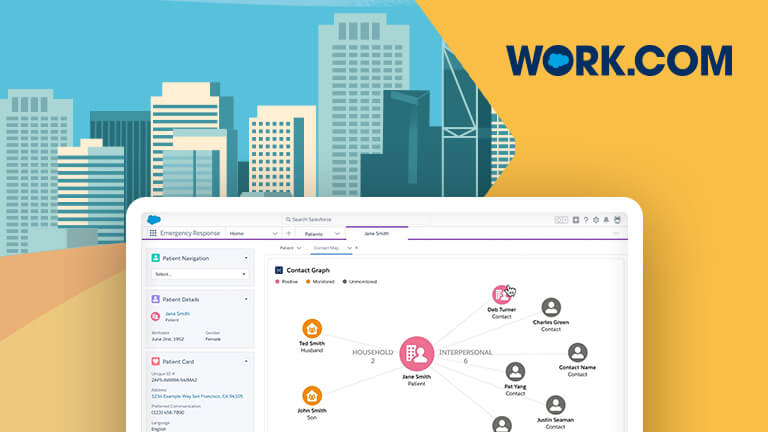 APPS
APPS
 APPS
APPS
 APPS
APPS
Salesforce.com Inc. said today it’s expanding its suite of Work.com tools that are designed to help companies get back to work safely during the COVID-19 pandemic.
Work.com was launched in May, providing technology tools and resources for businesses to reopen for work safely and get their employees accustomed to practicing social distancing in the work place. At launch, it included tools for employee wellness assessments, shift management, contract tracing and emergency response management.
The platform has proven to be popular with customers, Salesforce said, and indeed its own employees are using Work.com to adapt to the “new normal.”
Sarah Franklin, executive vice president and general manager of platform, Trailhead and AppExchange for Salesforce, told SiliconANGLE in an interview that Work.com had evolved rapidly as the company came to realize that the pandemic isn’t going away anytime soon.
In June, for example, the company said it was partnering with Siemens AG to integrate Work.com with that company’s smart infrastructure services, including its Comfy and Enlighted “internet of things” applications. Then in October, it teamed up with the identity and access management firm Okta Inc. to add new security capabilities to the platform.
“In May people thought maybe this is temporary, and that they can get by with spreadsheets and paper,” Franklin said. “Now, people know they need to lean into digital.”
Today Salesforce said it’s adding new employee workspace and help desk products to Work.com to help boost engagement and productivity, as well as applications that companies can use to communicate new policies and procedures aimed at creating safe in-person experiences.
Franklin said this was about Work.com expanding beyond just workplace safety and crisis response, to help companies move from “survival mode” to “thriving mode.” “Now, Work.com is a full suite of products,” Franklin said. “It’s an incredible product with lots of legs to go. We’re going where customers need us.”
Many of today’s updates are actually focused on remote work. For example, Work.com is getting a new Employee Workspace that serves as a central digital hub from which employees can access the tools and resources they need to work remotely, including various productivity apps, employee profiles, company updates and so on. The hub also enables personalized communications and notifications, giving employees more ways to collaborate and engage no matter where they are located.
Meanwhile, the new Employee Helpdesk serves as a place for employees to ask questions and resolve any issues they have, which could relate to things such as their employer’s human resources policy, benefits and perks, or issues they’re having with IT. The service is powered by Einstein AI chatbots, which can direct users to knowledge articles or put them in touch with another human when necessary.
Franklin said the Employee Helpdesk will help companies to treat their employees more like valued customers than staff, bringing a customer focus to their workers.
“Customers have come to us asking how do we have our employees have a single pane of glass to work in this new world,” Franklin said. “They don’t want to waste time trying to figure out what URL to go to, or what system to access.”
Salesforce has also created more applications to help businesses manage physical interactions safely. For example, the new Queue Management app enables virtual queuing at physical locations so customers can maintain social distancing. It eliminates the need for physical lines to keep visitors safe, while also monitoring capacity in real-time to ensure businesses can comply with local regulations for physical reopening.
There’s also a new Broadcast Messaging app companies can use to keep customers informed on their hours of operation, appointment times and health and safety instructions through channels such as WhatsApp, Facebook Messenger or SMS. That app also provides Einstein-powered chatbots to answer follow up questions and service requests.
The Digital Trust Cards app, meanwhile, enables physical stores to publish and embed their rules around cleaning, social distancing and mask wearing at specific locations.
Franklin said these apps are especially relevant as we move into the fall, when many experts warn that the number of COVID-19 cases could start rising again. “You want to know what you’re walking into,” she said.
With reporting from Robert Hof
Support our mission to keep content open and free by engaging with theCUBE community. Join theCUBE’s Alumni Trust Network, where technology leaders connect, share intelligence and create opportunities.
Founded by tech visionaries John Furrier and Dave Vellante, SiliconANGLE Media has built a dynamic ecosystem of industry-leading digital media brands that reach 15+ million elite tech professionals. Our new proprietary theCUBE AI Video Cloud is breaking ground in audience interaction, leveraging theCUBEai.com neural network to help technology companies make data-driven decisions and stay at the forefront of industry conversations.